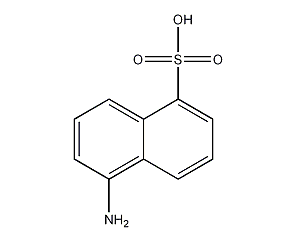
Structural formula
| Business number | 01V9 |
|---|---|
| Molecular formula | C10H9NO3S |
| Molecular weight | 223.25 |
| label |
1-Naphthylamine-5-sulfonic acid, 5-amino-1-naphthalenesulfonic acid, Laurentic acid, 1-Naphthylamine-5-sulfonic acid, Laurent’s acid, Fluorescent dyes |
Numbering system
CAS number:84-89-9
MDL number:MFCD00014315
EINECS number:201-571-0
RTECS number:QK1270500
BRN number:2214149
PubChem number:24886128
Physical property data
1. Properties: White needle-like crystals. It becomes anhydrous when dried in a desiccator or heated to 110°C. Turns purple slowly when exposed to air and more quickly when exposed to moisture. Its solution microscopically fluoresces green under sunlight.
2. Density (g/mL, 25/4℃): Undetermined
3. Relative vapor density (g/mL, air=1): Undetermined
4. Melting point (ºC): >300°C
5. Boiling point (ºC, normal pressure): Undetermined
6. Boiling point (ºC, 5.2kPa) : Undetermined
7. Refractive index: Undetermined
8. Flash point (ºC): Undetermined
9. Specific rotation (º): Undetermined
10. Autoignition point or ignition temperature (ºC): Undetermined
11. Vapor pressure (kPa, 25ºC): Undetermined
12 . Saturated vapor pressure (kPa, 60ºC): Undetermined
13. Heat of combustion (KJ/mol): Undetermined
14. Critical temperature (ºC): Undetermined
p>
15. Critical pressure (KPa): Undetermined
16. Log value of oil-water (octanol/water) partition coefficient: Undetermined
17. Explosion upper limit (%, V/V): Undetermined
18. Lower explosion limit (%, V/V): Undetermined
19. Solubility: Solubility in water at 15°C is 1 : 940, mostly soluble in hot water.
Toxicological data
1. Acute toxicity:
Rat caliber LD50: >33487mg/kg; rat abdominal LD50: 2880mg/kg;
Mouse caliber LD50: >5mg/kg ;Mouse abdominal cavity LD50: 2990mg/kg;
2. Other multiple dose toxicity:
Rat caliber TDL0: 30 mg/kg/30D-I
Ecological data
None yet
Molecular structure data
1. Molar refractive index: 58.27
2. Molar volume (cm3/mol): 148.6
3. Isotonic specific volume (90.2K ): 433.1
4. Surface tension (dyne/cm): 72.1
5. Polarizability (10-24cm3): 23.10
Compute chemical data
1. Hydrophobic parameter calculation reference value (XlogP): 1.4
2. Number of hydrogen bond donors: 2
3. Number of hydrogen bond acceptors: 4
4. Number of rotatable chemical bonds: 1
5. Topological molecular polar surface area (TPSA): 80.4
6. Number of heavy atoms: 15
7. Surface charge: 0
8. Complexity: 322
9. Number of isotope atoms: 0
10. Determine the number of atomic stereocenters : 0
11. The number of uncertain atomic stereocenters: 0
12. The number of determined chemical bond stereocenters: 0
13. Uncertain chemical bond stereocenters Number of structural centers: 0
14. Number of covalent bond units: 1
Properties and stability
It is toxic and can cause poisoning if inhaled, swallowed or absorbed through the skin. Easily oxidized and flammable.
Storage method
This product should be sealed and stored in a cool, dry and ventilated place, away from fire and heat sources.
Synthesis method
Naphthalene is sulfonated at low temperature to obtain naphthalene sulfonic acid, which is nitrated with nitric acid to obtain 5-nitro-1-naphthalene sulfonic acid, and then neutralized with magnesium carbonate to separate 1-naphthylamine-8-naphthalene sulfonate magnesium salt. The powder is reduced and acidified with sulfuric acid to obtain a peripheral acid. The filtrate obtained by neutralization and separation is reduced and acidified to obtain 1-naphthylamine-5-sulfonic acid.
Purpose
Used in organic synthesis. Dye synthesis. Mainly used to prepare azo dyes such as acid red, acid black C, weak acid black BR, direct date red GB, etc. It is also used to prepare intermediates such as 1-naphthol sulfonates.

 微信扫一扫打赏
微信扫一扫打赏

